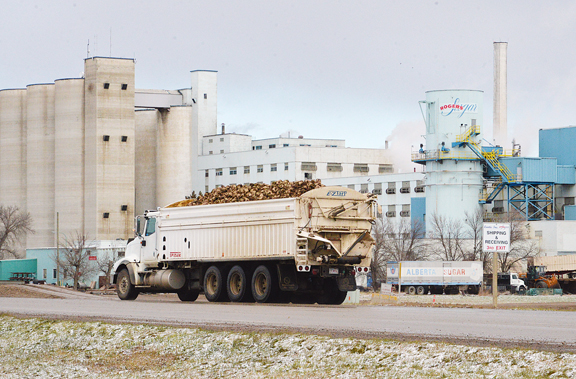Current Temperature
26.2°C
Agriculture industry facing uncertainties
Posted on January 14, 2021 by Vauxhall Advance ADVANCE FILE PHOTO
ADVANCE FILE PHOTOBy Tim Kalinowski
Southern Alberta Newspapers
While agriculture enjoyed somewhat of a bounce-back year in 2020 after a disastrous 2019, there are still many uncertainties facing the industry heading into 2021, says Alberta Federation of Agriculture President Lynn Jacobson.
COVID-19 remains a major issue of concern in agriculture, like in almost every other industry, says Jacobson, but he is not sure provincial government public health measures have been adequate to the task, and there has not been a lot of additional government support on any level to help farmers cope.
“We made due in a lot of cases,” he said. “There was a lot of innovative situations. There are still too many people ignoring a lot of the public health rules and regulations. One of the things I question is agriculture was exempted from things like masking, for example. But we still have a lot of cases now, especially in the feedlot industry, of COVID-19. So I think there needs to be some more thought put into that.”
Jacobson says COVID-19 is not the only area where the Kenney government also seems to be sending mixed messages to the agriculture industry.
On the one hand, says Jacobson, the Alberta government has been saying agriculture is a key industry they are relying on to help get the province out of the recession, but that hasn’t prevented them from massively cutting the Alberta Agriculture budget in 2019 and 2020.
“With the cuts to the extension programs and all the services people relied on,” said Jacobson. “That extension part of government now has all turned into private, and there is nothing really as an independent extension.”
“For example, they had a provincial entomologist, they had agrologists, and they had other people working on different programs that were independent of the industry. Most agrologists nowadays are working for bigger companies, and while they are good in a lot of areas, sometimes the advice is maybe not as neutral as it should be. They want the farmer to succeed, but they want them to spend their dollars into the corporations they work for. I would have more faith in the neutrality of a government employee.”
Jacobson says there are also problems with the Kenney government’s approach to farmer-led research through its RDAR (Results Driven Agriculture Research) program — there are strings attached no one knew about until they became obvious this year.
“On the research end, they said they were going to put $37 million into research,” he explained. “They are starting the new RDAR research, and they are saying it is independent and farmer-driven. That’s all fine, but they got rid of all the technical staff out of Alberta Agriculture — they just wiped those people out.”
“Now those former government facilities are going to have to be rented by the researchers, and so how this is going to work out is yet to be seen.”
Temporary Foreign Workers is another issue where the Kenney government has added complications for farmers, says Jacobson.
“The Kenney government has said, ‘No, we don’t want any more Temporary Foreign Workers coming into this province. We want to hire Alberta citizens,’” explained Jacobson. “That is all fine and good, but there are circumstances where we are not going to get local people to work for us in our industry. Some of that is around competitive wages, to a certain degree.”
“Some of it is around isolated living conditions. When your farm is 40 or 50 miles away from anything, getting people to actually live in one of the major towns like Taber or Lethbridge it is going to be hard to get those people to drive out to our farms to go to work,” he continued.
Jacobson also acknowledges a lot of experienced and older Canadian-born farm workers are likely leery of returning to work on farms if they have already obtained other employment after the Kenney government repealed Bill 6 and did not suggest a replacement — which would give farm workers rights and protections in some measure equivalent to other industries in the province.
“It is an issue,” he admited. “If you want people to start working on farms you have to give them some protections under the law.”
On a more positive note, Jacobson says there have been recent moves by provincial and federal agriculture ministers to go forward on a cost-effective, sustainable and reliable Farm Risk Management Program for producers Canada-wide, which would provide a strong backstop to help the industry grow.
“The federal government has finally moved since 2013, and made an offer to make the business risk-management program as it stands today better than it is,” he said. “With the program as it exists today, we have less than 47 per cent of producers actually participating.”
“And we think that is a hold back, especially when people in government are saying they want us to diversify, and agriculture is going to be one of the driving forces to bring us back out of this recession.”
Up until now, participating in existing federal programs has been onerous with inconsistent benefit versus costs, says Jacobson.
“We need a business risk program that will support the industry when times turn tougher,” he stated. “So they need to make it a program people can rely on as bankable, and then they can move ahead with their own businesses. Then they can actually access funds to be able to go ahead and do some of these (diversification) projects, and this value adding. The government is saying, ‘We really want you to do it.’”
“But until now, they are maybe not giving us quite the support this industry needs to do so.”
Leave a Reply
You must be logged in to post a comment.

 Log In
Log In